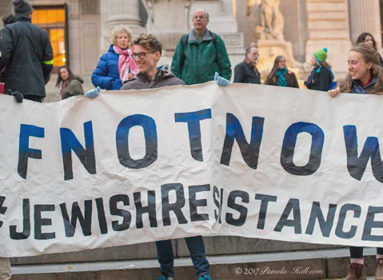WESTPORT — Every spring, AIPAC (American Israel Public Affairs Committee) brings together thousands of Israel supporters to its policy conference in Washington, D.C. The three-day program includes speakers’ presentations, educational sessions, and lobbying on Capitol Hill, drawing a diversity of participants from all 50 states and beyond – Jews and non-Jews, college students and academics, journalists, and military and government officials from the U.S., Israel, and around the world.
This year’s event saw more than 10,000 participants, the largest turnout ever. Several Connecticut attendees told the Ledger about their experiences.
Perhaps no other aspect of the conference was as highly anticipated or debated as the speeches by Pres. Obama and Israeli Prime Minister Netanyahu. Days before the event, in a speech delivered at the State Department, Obama called for the establishment of a Palestinian state based on 1967 lines, with mutually agreed-upon land swaps. The President followed up the hotly debated address with a speech at the opening session of the conference. Later, in the keynote speech at the conference banquet, Netanyahu
responded to Obama’s proposal, declaring that, in order to maintain its security, Israel could not return to the indefensible 1967 lines.
Most participants agree that the issue eclipsed the other speakers and discussions at the conference. “When Pres. Obama spoke to ‘clarify’ his remarks of the previous week, the audience showed its appreciation of his appearance and for many of his remarks with a standing ovation: He made extremely strong statements supporting Israel as a Jewish state and against the delegitimization of Israel,” says Shari Levy, a Westport resident who has attended the last several conferences with her children. “Those remarks which indicated Obama’s lack of understanding of the greater issues and which limit Israel’s ability in negotiating for peace, including referring to the 1967 borders with land-swaps, were generally met with silence.”

At the AIPAC conference (l to r): Don Gershman, Congressman John Larson and Eric Zachs
Prime Minister Netanyahu encountered a different response: “wholesale approbation,” Levy says. “Netanyahu reiterated realities on the ground in Israel and reminded us of the challenges that Israel and Israelis face on a daily basis,” she says. “As the current ‘face’ of Israel, Netanyahu was the recipient of the audience’s admiration and gratitude.”
Michael Sitver, a 14-year-old from Weston who attended his first conference last year, notes that the room was tense during Obama’s speech. “It seemed to me like the President spoke honestly, and he was speaking there in good faith, but there were definitely some disagreements between him and the attendees,” he says. “He thinks that if the Israelis were to offer more, the Palestinians would make peace. But the Palestinians do not even recognize Israel as a country. Israel has already offered so much. With Netanyahu’s speech, I learned a lot about how Israel and my own country are working together, and I loved how he incorporated famous American ideals into his speech and connected them to Israel to show that the two nations were intertwined.”
The mention of “1967 borders” is merely an echo of Presidents past, says Rabbi Robert Orkand, who led a delegation of 18 from Temple Israel in Westport. “In his speech, Pres. Obama clearly articulated his belief that the 1967 borders would be the starting point for negotiations, not the end point, and that there would be a land swap that would take into account present realities,” he says. “And, he made it clear that Hamas cannot be part of any Palestinian government and that the United States is absolutely committed to Israel’s security and will fight any attempt to disenfranchise the Jewish state.”
The Israeli-Palestinian conflict was not the only issue discussed, says Don Gershman, chair of the Greater Hartford AIPAC Council
and member of the AIPAC National Council. “Unfortunately, there have always been urgent issues that have been the focus of the
policy conference, and this year was no different, from Iran’s continuing efforts to develop nuclear weapons, to the Palestinian attempt to have the UN declare a Palestinian state, and uncertainties created by the ‘Arab Spring’ movements,” he says.
While the two heads of state proved to be the hottest ticket at the conference, these other issues were taken up in presentations, educational breakout sessions, and lobbying activities that comprised the rest of the conference.
Attendees returned from the event with renewed commitment to support Israel and its relationship with the U.S.
“It is an amazing experience,” says Sitver. “For three days I had the opportunity to immerse myself in a fascinating subject I care
a lot about. I gain a much greater understanding of the issues Israel faces every day, how we in the U.S. are affected by Israel, and why Israel is persecuted.”
First-timer Eric Zachs of West Hartford will work to get more Hartford-area people to attend next year. “The conference is very good for community-building and strengthening our ties to Israel, he says. “A lot of people brought their children and grandchildren; there were a lot of rabbis with their congregants. The conference serves as a ‘mini Israel mission,’ as significant an identity-building experience as Jewish summer camp or a trip to Israel.”
And with the phrase “1967 lines” now fueling a healthy debate among Israelis, says Orkand, “it is imperative that the American
Jewish community engage in that same debate, that we recognize that good people can have differing views without the name-calling that has, unfortunately, been so prevalent of late.”
The 2012 AIPAC policy conference is planned for March 4-6. For more info: www.aipac.org.







 Southern New England Jewish Ledger
Southern New England Jewish Ledger














